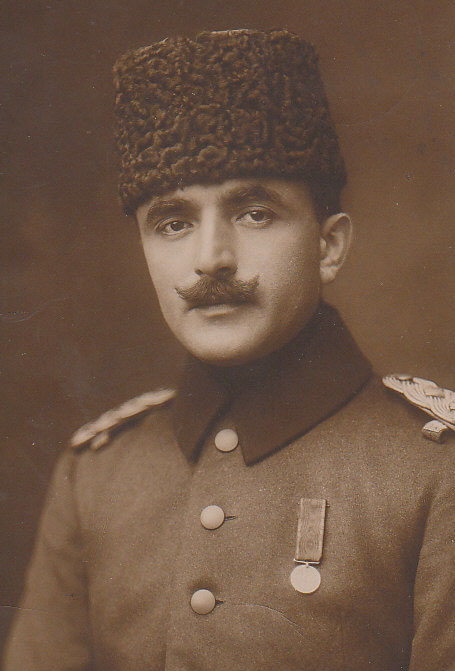
Enver Pasha (Ottoman Turkish: Turkish: Enver Paşa) or Ismail Enver Pasha İsmail Enver Paşa, born Ismail Enver) (November 22, 1881 – August 4, 1922) was an Ottoman military officer and a leader of the Young Turk revolution. He was the main leader of the Ottoman Empire in both Balkan Wars and World War I. Pasha is a title that changed with his military ranks; through his career he was known by increasing titles, including Enver Efendi, Enver Bey, and finally Enver Pasha, which is a higher title than Mirliva.
Although the Ottoman Empire had shrunk and its military forces seemed weakened in the years before World War I, the country had been modernizing fairly rapidly. In a seizure of power, a group of military men and political leaders known as the Young Turks took over in 1908, retaining the sultan in name, but working to reduce the influence of Islamic clergy. In their efforts to westernize the country, they brought in military advisers from Europe and built up the armed forces. Reforms in the status of women, in education, and in other areas of life proceeded more slowly than the improvement in the military. The leaders, Enver Pasha, Talaat Bey, and Djemal Pasha proclaimed the official equality of all faiths, Jewish, Christian, and Muslim, within the state. In some of the Arabic-speaking areas of the Empire, such as Syria, Palestine, and the Arabian Peninsula, resentment at the Turks for their movement away from traditional Muslim values simmered beneath the surface.
Several factors pushed Turkey in the direction of allying with Austria-Hungary and Germany. Although the Young Turks admired both German and British modernity, British Liberals had openly criticized Turkish policies and the regime. Russia and Turkey had a long history of conflict, and Russia had made no secret of its ambitions to control the Bosporus and the Dardanelles. Meanwhile, Germany had tried to build up friendly relations with Turkey by sending military advisers. The effort lead to a secret treaty signed just before the war, in which Enver Pasha, the Young Turk war minister, agreed to assist Germany in event of war. Nevertheless, Turkey appeared to waver and remained officially neutral through the first three months of the war.
Several events made it easier for Turkey to meet its treaty obligations. First, the British decided, given the well-known pro-German stand of Turkey, to refuse to deliver two new battleships that had been ordered by Turkey, paid for, and built in British yards. The Young Turks played up the British offense to their sovereignty in the press and public opinion took a decidedly anti-British turn.
Another maritime development provided the final push. Germany had two battleships in the Mediterranean when the war started, the battle cruiser Goeben and the light cruiser Breslau. After some inconclusive engagements with British warships, the commander of this small German force, Admiral Wilhelm Souchon, decided to proceed to Constantinople. After some negotiations, the Turks agreed to let the German ships proceed through the Dardanelles, on condition that the Turkish navy purchase them. The purchase went ahead, with the German officers remaining in charge to train Turkish sailors, and Turkish vessels escorted the ships through the minefields of the Dardanelles to the safety of Constantinople. The Turks assured the Germans that no combatant warships, such as those of the British or French, would be allowed to pass the officially neutral waterway.
By the end of October, the German command decided the time had come to bring Turkey into the war. In order to provide the precipitating incident, the two German warships left Constantinople, under nominal Turkish control and flags but officered and partially crewed with the original German sailors, and steamed across the Black Sea, where they shelled three Russian ports. Russia, with its long-standing interest in controlling the route to the Mediterranean, needed no further provocation for a war with the sick man of Europe. Russia declared war on Turkey, dreaming of the day when the Bosporus would become a permanent Russian transit route.